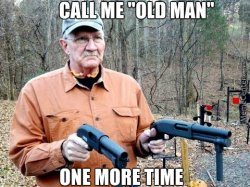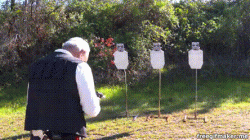C3D
.338 Win Mag
Dementia and Firearms Make a Dangerous Combination
As the U.S. population skews ever older, the number of people stricken with dementia steadily rises. Alzheimer’s disease already afflicts nearly 6 million Americans, and the number is projected to multiply in coming decades.
This, in turn, stands to boost the number of injuries and deaths caused by firearms. As dementia sufferers lose mental faculties, some become prone to delusions, paranoia and physical aggression. Such symptoms are more dangerous when a patient has easy access to guns.
Yet older Americans are especially likely to be gun owners. Roughly 45 percent of Americans over 65 either own a firearm or live in a household with one. A significant share of those residents may suffer from dementia. One studyestimates that by 2050 up to 11.8 million persons with dementia could live in a home with a firearm. A recent Washington state study found that about 5 percent of the state’s population — 54,000 residents — had both cognitive decline and access to firearms at home. (About 15,000 of them had access to unlocked, loaded guns.)
This is probably a severe undercount, because dementia often goes undiagnosed. Consider the 76-year-old Milwaukee man who was considered mentally competent when he was convictedof murdering his neighbor, a 13-year-old boy he had accused, without evidence, of stealing some of his guns.
Partly in response to mass shootings, more than a dozen states have enacted red flag laws, which enable family members or law enforcement to petition a court to temporarily remove guns from a person who could be a danger to self or others. In at least 42 percent of mass shootings from 2009 to 2016, the attacker had exhibited warning signs before a shooting, according to a national study by Everytown for Gun Safety, a gun-regulation advocacy group backed by Bloomberg L.P. founder Michael Bloomberg.
Addressing the volatile mix of dementia and guns will require both cultural adaptation and clear legal parameters. In cases of dementia, doctors and caregivers need to be prepared to discuss gun possession with patients and family members, and to refer dangerous cases to authorities. Too many families are reluctant to remove guns from a loved one in mental decline. It would help for more states to enact red flag laws.
Each day, for the next 11 years, roughly 10,000 Americans will turn 65. As Americans age, live longer, and become vulnerable to cognitive loss, the risks posed by gun possession will grow. To prevent tragedy, society must take steps to keep lethal weapons away from those who put themselves or others at risk.
No word on whether old people drivers’ licenses or rights to vote are also subject to these concerns.
https://www.bloomberg.com/opinion/a...rearms-make-a-lethal-combination?srnd=premium






